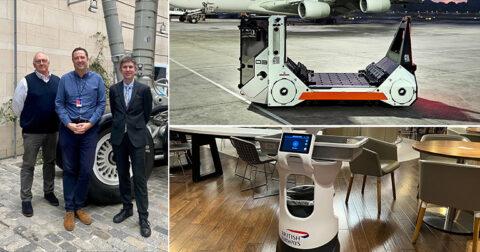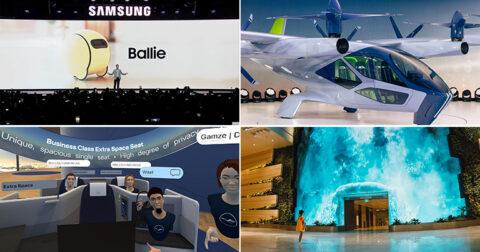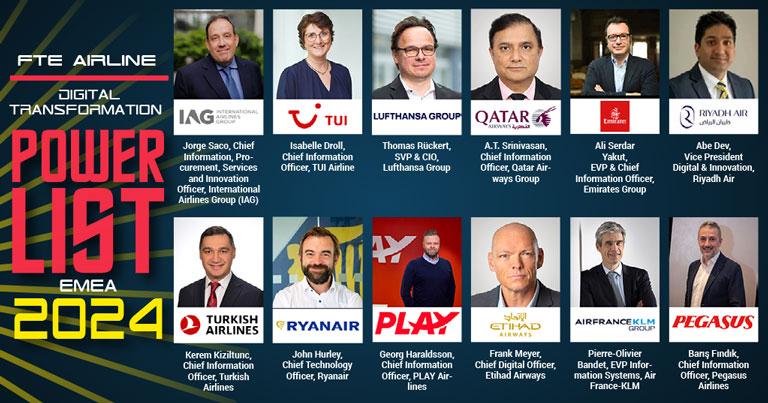
Future Travel Experience is excited to unveil the FTE Airline Digital Transformation Power List EMEA 2024. Here we shine a light on those who are pioneering new approaches that have the potential to improve travel for passengers and make the industry safer, more efficient and commercially successful. The EMEA edition champions the most transformative change enablers within the airline and airport industry in Europe, the Middle East and Africa for their outstanding efforts to lead how their organisation has embraced digital innovation. In 2024, FTE is more committed than ever to supporting digital transformation efforts in the industry through the FTE Digital, Innovation & Startup Hub, which is a truly unique community designed specifically for the individuals and organisations who are at the forefront of digital transformation and innovation in aviation. The FTE Hub is focusing on three key themes this year – Artificial Intelligence (AI), Robotics, and Internet of Things (IoT) – and in alignment with that, the Power List recognises those that are leading key digital transformation efforts. In recognition of their leadership and achievements, each member of the Power List will receive a complimentary “Golden Ticket” to the co-located FTE EMEA and FTE Ancillary & Retailing events, taking place in Dublin on 11-13 June 2024. After extensive research into each candidate, we believe the following 12 executives have been at the forefront of innovation, driving transformational change for their organisations and the wider industry.
Jorge Saco, Chief Information, Procurement, Services and Innovation Officer, International Airlines Group (IAG)

Jorge Saco was appointed Chief Information, Procurement, Services and Innovation Officer at International Airlines Group (IAG) – a Corporate Partner of the FTE Digital, Innovation & Startup Hub – in July 2023. IAG, whose member airlines include British Airways, Iberia, Aer Lingus, Vueling and LEVEL, is on an impressive transformation journey as FTE reported in this exclusive article – not only of its own operations, but also how our industry operates. It is collaborating with its airport partners on a wide range of trials, covering robotics & automation, Artificial Intelligence (AI) & Machine Learning, biometrics & digital identity, personalisation, collaboration with startups, sustainability, private networks & Internet of Things (IoT), and much more across the ramp, lounges and accessibility.
British Airways’ recently-announced £7 billion transformation plan, for example, aims to deliver a world-class CX including a more personalised digital experience.
IAG’s digital transformation efforts are also a focus of Hangar 51, the innovation team at IAG, which is helping test and scale high-impact emerging technologies across the group.
Robotics and automation are key focus areas for IAG and the overarching technology underpinning IAG’s innovation efforts is AI. Its efforts in this space are undoubtedly among the most impressive FTE has seen. The recently-created IAG.ai has received significant investment, with a lab in London and plans to open another in Barcelona, as well as further locations to accelerate innovation. Among IAG.ai’s developments are an internal generative AI, which has already been rolled out to 50 innovators and produced visible productivity gains. IAG is also part of the Microsoft 365 Early Access Program, trialling generative AI across Microsoft 365 platforms.
It is clear that IAG is on a very exciting journey and has AI, startups and collaboration right at the top of its agenda.
While a number of members of the IAG innovation teams are contributing to digital transformation efforts, as Chief Information, Procurement, Services and Innovation Officer, Jorge Saco is recognised on the Power List for his technology-focused leadership.
Isabelle Droll, Chief Information Officer, TUI Airline
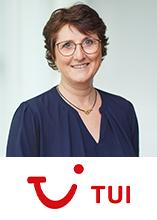
Digital transformation is a top priority for TUI Group, which is striving to enable a fast and efficient implementation of its ambitious digitalisation strategy. As Chief Information Officer, Isabelle Droll leads TUI Airline’s focus on new technologies and digital trends, defining the IT roadmap and delivering successful, technology-enabled change projects.
TUI is, for example, leveraging generative Artificial Intelligence (AI) in its app to modernise its customer engagement and describes the likes of Open AI’s Enterprise ChatGPT and Amazon Web Services’ Bedrock as a big accelerator for enterprise-level AI development, allowing TUI to use its vast customer data safely and securely. TUI sees such digital acceleration as a way to personalise the app experience.
Integrating new technologies, such as Machine Learning, is also helping TUI ensure it delivers the best customer experience through having a faster, more stable and more accurate platform, while also enabling a personalised customer experience.
Isabelle Droll is included on the Power List for her role in leading TUI Airline’s digital-first approach to further enhancing the passenger experience.
Ali Serdar Yakut, EVP & Chief Information Officer, Emirates Group
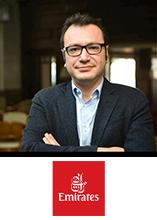
Ali Serdar Yakut joined Emirates Group as EVP & Chief Information Officer in May 2023. His approach is very much data-driven, delivery-focused and supportive of innovation.
Emirates Group’s focus on digital transformation saw the opening of a new, high-tech innovation hub – Ebdaa – in December 2023. Ebdaa, which means ‘creativity’ in Arabic, researches and develops the latest tech, with the aim of designing “amazing experiences for customers” and creating tailored solutions for Emirates Group. The three key technologies it is currently focusing on are robotics, Artificial Intelligence (AI) and Web 3.0. This follows last year’s opening of the Innovation Majlis at Emirates Group’s Dubai HQ. As a platform to foster deeper research and development, and greater exchange of cutting-edge ideas, the Innovation Majlis showcases the latest in robotics, hyper-reality, holograms, sensor tech and other advanced technologies.
A key development in the robotics space is Emirates’ introduction of its newest addition to the team, Sara, the world’s first robot check-in assistant at its Emirates City Check-In facility.
Meanwhile, Emirates Group has also embarked on a futuristic, immersive digital journey to transform its employee experiences by collaborating with Amazon Web Services (AWS) on a first for the industry. Together, they have developed an immersive Extended Reality (iXR) platform for Emirates Group’s cabin crew, new joiners, and the wider industry partner community. This includes 3D virtual hubs, virtual training, gamified environments, and simulated experiences, powered by spatial computing and AI.
Thomas Rückert, SVP & CIO, Lufthansa Group
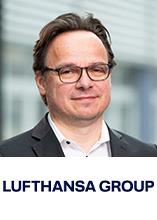
Thomas Rückert, SVP & CIO, is central to the transformation journey to becoming “One Tech Community” across Lufthansa Group, bringing together all colleagues who are driving digitalisation for member airlines and their customers. The key is leveraging synergies in the sense of “do-IT-once” and offering customers irresistible digital offers faster.
Lufthansa Group’s culture aims to foster innovation on all fronts. The approach to digitalisation is to encourage a culture where ideas germinate in every department, fostering an entrepreneurial mindset to proactively address challenges. With Digital Hangar for example – the airline’s digital-focused business unit – Lufthansa aims to accelerate digital transformation, “creating the world’s best connected travel experience”.
Lufthansa Group is intensively working on enhancing and digitalising its customer services with Artificial Intelligence (AI) and Machine Learning technologies, with the aim of offering hyper-personalised passenger services. Autonomous vehicles and automation on the ramp is another key focus area.
Mixed Reality is also being leveraged in close collaboration with Meta. Last year’s launch of Lufthansa Allegris – the airline’s new approach to long-haul travel – leveraged the Metaverse with partners Meta Reality Labs and MSM.digital.
Lufthansa Innovation Hub also has an important role, aiming to pioneer the future of travel for Lufthansa Group and also the wider industry; among its most recent developments, as reported by Future Travel Experience here, is Swifty – an AI assistant that aims to transform the business travel booking process into a fast and efficient experience through automation. Lufthansa Group is also harnessing the power of data and Machine Learning to deliver tailored experiences designed to exceed passenger expectations.
The FTE Power List recognises Thomas Rückert as a key figure in Lufthansa’s digital transformation, as the group continues to safeguard its leading market position and economic success as an agile and flexible organisation.
A.T. Srinivasan, Chief Information Officer, Qatar Airways Group
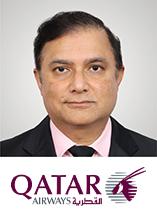
Innovation is the key pillar of the Qatar Airways vision as it aims to push the boundaries of what to expect from the travel experience of the future. The airline’s digital innovation approach is focused on enhancing the experience of passengers and employees, while delivering operational efficiencies using technology. Qatar Airways recently launched the next phase of its digital transformation plan, with a focus on smart onboard functionality designed to help deliver personalised experiences to travellers. Indeed, the airline has taken major strides recently in its digital transformation, including its collaboration with Google Cloud to explore data analytics and Artificial Intelligence (AI) solutions for enhanced customer experiences and sustainability.
The airline’s work with AI is particularly impressive, including the recent launch of its second-generation virtual cabin crew, Sama 2.0, powered by innovative conversational AI. Qatar Airways is the world’s first airline to develop the AI-powered digital human cabin crew to assist its passengers in designing curated travel experiences. Enabled by conversational AI, Sama will continue to learn and develop over time to improve responses through passenger interactions. Sama 2.0 can answer questions in real time, such as Qatar Airways FAQs, and is accessible through QVerse – Qatar Airways’ immersive digital platform – as well as through the Qatar Airways app.
Meanwhile, a new generative AI experience is designed to make travel planning hassle-free and personalised, using frictionless visual interactions and an interactive 3D map.
Abe Dev, Vice President Digital & Innovation, Riyadh Air

The rise of Saudi Arabia’s air transport sector is among our industry’s biggest stories right now. The new airlines and airports taking shape there will redefine excellence and disruptive approaches, none more so than the first truly digitally-native airline Riyadh Air, which was established in March 2023 with the vision to be at “the cutting-edge of digital aviation”.
In its first 12 months, Riyadh Air has agreed major technology partnerships with the likes of IBM, Accenture, Microsoft, Oracle, Sabre, and Adobe. Its aim is to unlock digital leadership, drive innovation and develop the cutting-edge technologies to deliver seamless travel experiences. The recently-announced partnership with IBM, for example, will create a passenger experience that is seamless, personalised and sustainable. From Artificial Intelligence-powered check-in systems to immersive inflight entertainment, Riyadh Air is leveraging the latest technologies to make air travel “more enjoyable and accessible for everyone”.
Riyadh Air has announced a significant order of up to 72 Boeing 787-9 Dreamliners, with the first deliveries scheduled for early 2025. The agreement is part of Saudi Arabia’s wider strategic plan to transform the country into a global aviation hub, with Riyadh Air to connect customers with over 100 destinations worldwide by 2030. The airline plans to equip the aircraft with state-of-the-art, innovative cabin interiors and experiences, including next-generation digital inflight entertainment systems and connectivity solutions.
As Vice President Digital & Innovation, Abe Dev is leading Riyadh Air’s efforts to be at the cutting-edge of technology, enabling digital innovation at every passenger touchpoint, and being “a true disruptor in terms of guest experience”. He joined Riyadh Air in May 2022, bringing a wealth of experience from previous roles including Head of Technology at Qantas Regional Airlines, and most recently Director of Technology at Etihad Airways.

The co-located FTE EMEA and FTE Ancillary & Retailing, taking place at the RDS in Dublin on 11-13 June 2024, will be a mega-event where the worlds of digital, commercial and CX will collide. One registration provides access to both events, where attendees will hear inspirational presentations from a number of the leading airlines listed here including International Airlines Group (IAG) and PLAY Airlines, as well as United Airlines, Virgin Atlantic, flyadeal, LATAM Airlines, Viva Aerobus, and many more speakers from inside and outside the industry.Find out more and register to attend >>
Kerem Kiziltunc, Chief Information Officer, Turkish Airlines
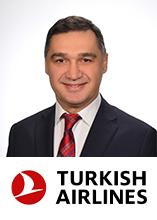
Turkish Airlines’ strategy and targets for 2023-2033 include a key goal to rank among the top 3 airlines globally in providing the best digital experience by implementing new projects in digital transformation.
The latest digital offering on this journey is TK Wallet, which has been incorporated into digital services used through the Turkish Airlines mobile app and website. TK Wallet allows Miles&Smiles members to complete payment and refund processes quickly and easily. It is just the latest development in Turkish Airlines’ acceleration of digital transformation to increase the efficiency of its products and services.
The airline is strengthening passenger interaction with its brand through new digital interfaces and implementing new technologies that have the potential to generate income with a “time-to-market” sensitivity. Strategic initiatives include a mobile-oriented seamless experience, with touchless boarding via kiosk, self bag-drop and biometric verification. The emphasis is on an end-to-end digital experience in airports, in lounges, and onboard aircraft.
Digital innovations Turkish Airlines is working on also include rewriting its proprietary Passenger Service System based on IATA’s ONE Order standard. Meanwhile, data-driven transformation includes the implementation of Artificial Intelligence in areas including crew planning, flight operations and customer experience.
In addition to his position as Chief Information Officer at Turkish Airlines, Kerem Kiziltunc is Chair of IATA’s Digital Transformation Advisory Council. Alongside delivering the vision to be one of the top 3 digital airlines in the world, he is therefore also recognised on the FTE Airline Digital Transformation Power List EMEA 2024 for his strong leadership role within the industry.
John Hurley, Chief Technology Officer, Ryanair
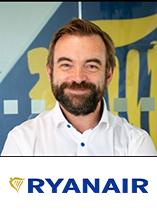
Ryanair’s Chief Technology Officer John Hurley continues to drive the airline’s digital transformation strategy from a low-cost carrier to its ambitions of becoming the “Amazon of Travel”.
Digital initiatives include the Day of Travel Assistant within the Ryanair app, Digital Self-Service Hub and myRyanair Wallet. Using the Day of Travel app, customers are able to get live updates and notifications about the airport, including terminal and gate information. Passengers receive live videos and webcasts from Ryanair’s operations centre during major disruptions. The app also provides easy access to boarding passes and other travel documents.
Customers can use the Digital Self-Service Hub to change flights, update passenger information, and add bags, seats and other services. Meanwhile, myRyanair Wallet gives customers quick access to book flights using their wallet balance and provides real-time status updates on refunds.
The airline has partnered with Amazon Web Services (AWS), rebuilding its legacy systems into cloud-based, innovative services and leveraging Machine Learning to transform the digital experience of its customers. As part of efforts to further explore the potential of Artificial Intelligence (AI) and Machine Learning, Ryanair is engaging with the AWS Generative AI Innovation Center to explore developing and deploying generative AI solutions.
Meanwhile, Ryanair last year entered a strategic collaboration with technology solutions provider Airware to harness cutting-edge innovation to reshape the bag drop process. The airline has reduced bag drop times to a maximum of three minutes, completed via the traveller’s smartphone.
As Chief Technology Officer, John Hurley also leads the team of developers working at Ryanair Labs, the airline’s digital innovation hubs based in Dublin, Wroclaw, Madrid and Portugal, which continue to deliver the core digital facets of the airline’s “Always Getting Better” programme.
Georg Haraldsson, Chief Information Officer, PLAY Airlines

A digital focus is central to the strategy of Icelandic low-cost airline PLAY, with progressive, customer-centric solutions designed to both enhance the passenger experience and increase ancillary revenue.
As part of its continuing investment in innovative solutions to help boost ancillary revenues and enhance the travel experience, PLAY last year selected MOST to provide it with onboard retailing and payment solutions. PLAY is paving the way for a future of frictionless inflight payment technology.
The airline is making a significant investment into a new Customer Data Platform (Segment) and amplifying the impact this will have by onboarding other partners such as FullStory, MixPanel and Braze. Each one of these partners will help it with acquisition, conversion optimisation, and a better customer experience as PLAY understands its customer. Crucially for the business, it will also generate a higher average basket value of each customer by allowing the airline to drive interaction and, as a result, sales.
Meanwhile, as Future Travel Experience recently reported in this exclusive interview, PLAY sees a significant opportunity to enhance its customer experience through digital innovation and is, for example, utilising a piece of crew technology with partners MoveFast, as well as working with Bluebox for onboard digital retailing.
The airline is also utilising digital tools such as its chatbot Playfin and a disruption management tool to enhance the passenger experience.
There is lots happening for PLAY in the digital innovation space, with more to be announced. As Chief Information Officer at PLAY, Georg Haraldsson is recognised for leading the company’s progressive digital development and information technology.
Frank Meyer, Chief Digital Officer, Etihad Airways

Frank Meyer leads the Digital, Technology & Innovation Division at Etihad Airways Group and is a member of the Executive Committee. Prior to joining Etihad, he held a senior transformation role at Emirates, and served as CIO of Swiss International Air Lines.
Innovation is not just a buzzword to Etihad Airways. It values and encourages innovation from within its organisation and also through its global network of partners.
Digital transformation efforts to ensure a seamless travel experience are supported by Etihad’s Innovate Lab, which accelerates the delivery of promising ideas and projects with streamlined governance, seed funding, dedicated resources and an external network of partners. The airline aims to provide the optimal conditions to deliver Proof of Concepts, prototypes, pilots and minimum viable products across Etihad.
Etihad recently began using Artificial Intelligence (AI) to enhance safety management systems for customers and crew, elevating them to an advanced level of sophistication. This strategic move signifies the airline’s commitment to enhancing safety protocols through cutting-edge technology and is enhanced by Machine Learning technologies, including Google BERT, Microsoft Azure, and TF-IDF, which contribute to its advanced analytical capabilities.
Enhanced inflight connectivity has also been a key focus area, with Etihad’s new 787s equipped with a Viasat solution using Ka-band technology which offers high-speed Wi-Fi with streaming capabilities as well as live TV. Meanwhile, the airline’s Wi-Fly means all Etihad Guest members enjoy complimentary chat packages, and all travellers can purchase a full surf package with unlimited data for the duration of their flight.
Pierre-Olivier Bandet, EVP Information Systems, Air France-KLM
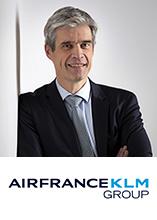
Pierre-Olivier Bandet was appointed Executive Vice President – Information Systems, Air France-KLM, in January 2023. He was previously CEO of HOP! since 2019 and also a member of the Air France Executive Committee since 2014.
As Air France-KLM accelerates its transformation, it continues to invest and innovate in high-performance information systems. Data, Artificial Intelligence (AI) and cyber risk prevention are all areas in which the Air France-KLM Group is further developing its expertise, and Bandet is playing a key role in strengthening the group’s leadership in its IT activities.
For some years Air France and KLM have combined their digital development resources and expertise to create a joint digital ecosystem for the Air France and KLM brands. Based on agile methods of working, a continuous effort is directed at providing customers with a state-of-the-art digital experience. The foundation of this ecosystem is a joint API framework, covering the entire journey. A recent example is Air France-KLM Group further digitalising the passenger experience at Paris CDG Airport and Amsterdam Airport Schiphol.
Air France-KLM continues to invest in further empowering staff through the use of digital tools, with the aim of enabling them to surpass customers’ expectations. The group wants to ensure an unrivalled end-to-end customer experience, which exceeds expectations at all touchpoints. It is also targeting improving the customer experience through personalised and digitalised offers and best-in-class operational performance.
Both Air France and KLM are also innovating in the area of baggage transformation, through their membership of the FTE Baggage Innovation Working Group. One example of innovation in the baggage space is Air France’s collaboration with IDEMIA on ALIX – an AI-based solution to automate the lost luggage identification process.
Barış Fındık, Chief Information Officer, Pegasus Airlines

Having originally launched its digital transformation programme in 2018 under the motto “Your Digital Airline”, Pegasus Airlines is now entering an ambitious new chapter, taking significant steps in the technology arena to secure the sustainable development of its digitalisation journey.
Leading efforts to provide the best digital experience for customers is Barış Fındık, Chief Information Officer. Pegasus is determined to become one of the world’s most technologically-advanced airlines. In pursuit of this, it is taking significant strides to evaluate collaboration opportunities with startups, universities, and other players in the field of technology and aviation.
Among the latest developments on this digitally-focused journey is Pegasus’ recent establishment of a Silicon Valley-based Technology Innovation Lab. By keeping pace with the latest technological advancements in Silicon Valley, Pegasus aims to reinforce its goal of being influential not only within a local, but also a global, framework. The focus is on Artificial Intelligence, mobile capabilities, self-service, and other cutting-edge technologies that the airline believes will directly enhance its business.
Aiming to use investment in technology as a key differentiator, Pegasus is developing many projects focused on digital transformation including the FlyBot virtual assistant. The airline has integrated ChatGPT technology into FlyBot and launched “Plan your travel with ChatGPT” support.

